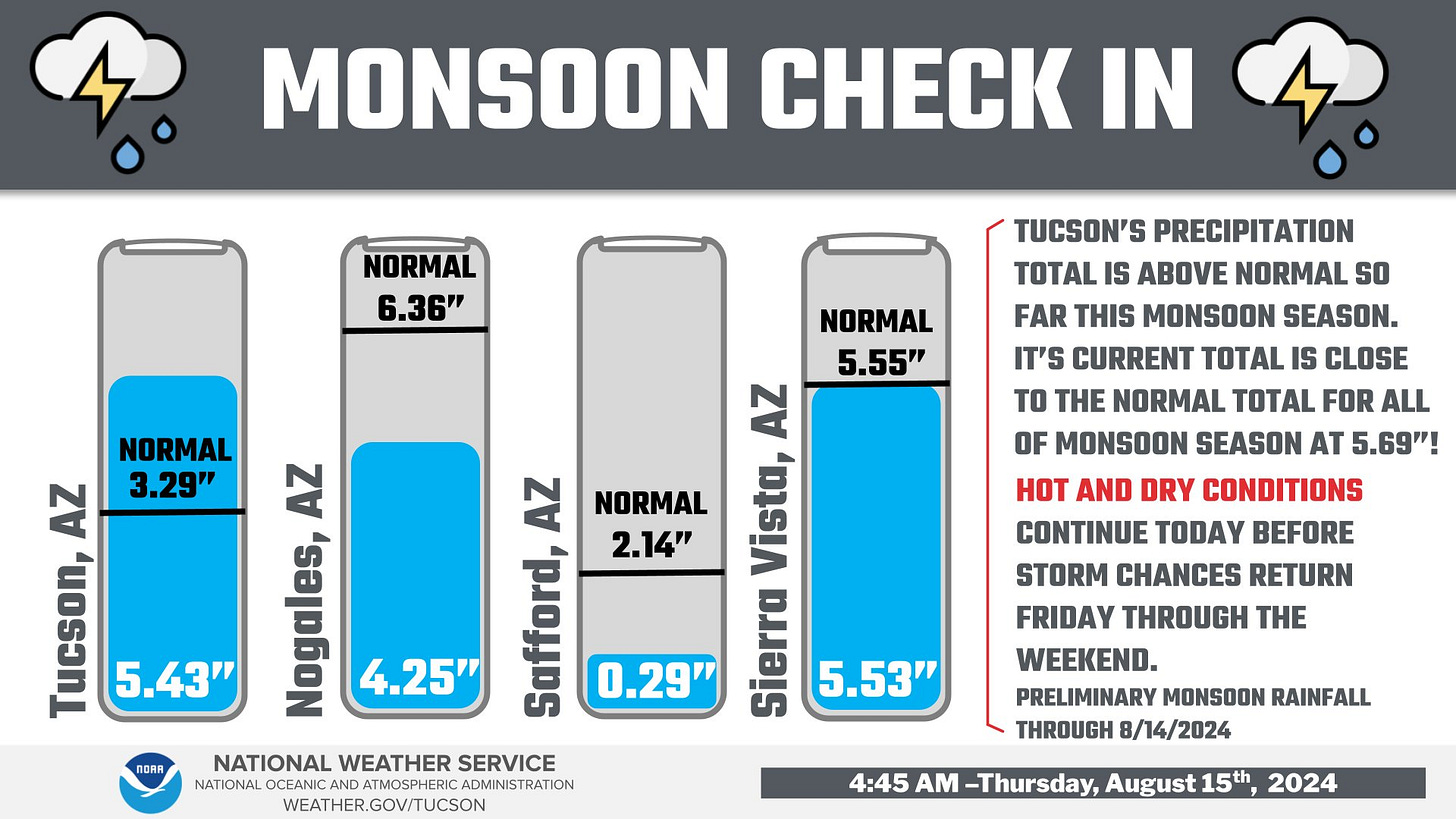The Daily Agenda: Extreme makeover: County edition
A county department is getting a new name ... Officials say the old one was at best confusing and at worse, misleading ... Marana race headed for a recount.
When people hear the words “behavioral health,” many think of mental health and substance use disorders. But that messaging has proven to be a challenge for one county department.
Effective September 1, the Pima County Behavioral Health Department will be called Detainee and Crisis Systems to better reflect what it actually does.
While the change may seem quick, it's actually decades in the making and the result of the department’s shifting focus and changes to the laws and system surrounding health care costs, according to a memo by Pima County Administrator Jan Lesher.
But most importantly, it will clear up a frequent misunderstanding.
“We get confused with the health department all the time,” Director Paula Perrera told the Tucson Agenda. “All the time.”
Perrera wrote in a memo to Lesher that the current name “causes confusion at best and is misleading at worst.”
The department isn’t open to the public in that people can’t go knock on the door and be provided with or connected to services.
Instead, it handles payments for treatment and care the county is mandated to cover, serving as the "insurance-of-last-resort" for anyone in the criminal justice system — defendants, victims or anyone being civilly committed.
It also pays for the medical, dental and behavioral health care of everyone booked into the jail and juvenile detention center, and oversees the operating agreement with the Crisis Response Center.
Finally, it provides support through a program called INVEST, which stands for “Inmate Navigation, Enrollment, Support and Treatment.” Perrera defined INVEST as a treatment reform program that involves looking at things from a slightly different angle.
“It’s about getting people the treatment they need in a way that’s accessible to them, but also helping people navigate the system and access resources,” she said.
INVEST staffers begin working with people when they’re in custody, providing education and treatment services to those in jail.
By the time they walk out, a treatment plan has been developed and a car is waiting to take them to residential treatment.
Staffers line up housing for when the person has completed treatment and help them schedule and get to follow-up appointments.
“A lot of time the court will sentence people to treatment, but that doesn’t equate to an authorization from an insurance company that will pay for treatment,” Perrera said. “And even with regular insurance, finding a physician in-network that is taking new patients can be difficult. We try to help people navigate all that.”
The program is undergoing a randomized control trial to measure its efficacy with data to be available by the end of the year. But early results are promising, Perrera said.
Thanks to some money from the Arizona Attorney General Office’s opioid settlement money, the department has been able to double the size of the INVEST program.
The department also has used opioid settlement money to expand its use of release planners, who set up treatment plans and post-release appointments for members of high-priority populations — people with chronic health problems, substance use and mental health issues.
Planners also help people enroll or re-enroll in the state’s Medicaid program, Arizona Health Care Cost Containment System, so there’s no lapse in coverage when they leave jail.
Perrera wrote in the memo that everyone served by the department is experiencing some sort of crisis and it works with community partners to address needs as part of a continuum of care.
She told us that the jail is part of that continuum of care, just like a primary care center, emergency room or urgent care, and it’s important to get people connected to care when they’re in custody.
Once they’re out, she said, it’s very difficult to reconnect.
“For a lot of people in jail, the only time they get health care is while they’re in custody,” she said. “They’re here, we can talk to them now, so we see it as an opportunity for people to access the resources they need to be successful when they leave.”
This story was supported by the Local News Initiative of Southern Arizona, a fund of the Community Foundation for Southern Arizona.
Fixed income: Former Santa Cruz County Treasurer Liz Gutfahr will have to live on $2,000 a month as the court deals with a lawsuit filed against her by county officials, the Nogales International’s Daisy Zavala Magana reports. Officials say Gutfahr embezzled nearly $40 million in county funds and most of her assets were placed under a temporary receiver to make sure she can’t move or hide those assets.
Too close to call: A Marana Town council race is going to a recount, KGUN’s Madison Thomas reports. While newcomer Patrick Cavanaugh was declared the winner of one of the open seats, the second seat can’t be declared yet because candidates Roxanne Ziegler and Melissa Zupi are separated by 14 votes. The law requires a recount when the margin is less than or equal to one-half of one percent of the number of votes cast for both candidates. The elections department said it will proceed with the recount once it’s ordered by the court.
Supercharged: Another big solar battery plant is incoming, the Arizona Daily Star’s David Wichner reports. Tucson Electric Power is planning the 200-megawatt Roadrunner Reserve II system for the southeast side, where it will store solar and other energy to meet peak power demand later in the day. The new plant will be a twin to a system under construction south of Interstate 10 off Santa Rita Road. It will store enough energy to serve about 42,000 homes for four hours at full capacity.
Water world: Arizona Public Media’s Danyelle Khamara and Katya Mendoza dive into the cross-border history and future of the Santa Cruz River for the latest episode of the podcast “Tapped.” The duo report that collaboration between the U.S. and Mexico has improved the once-polluted and depleted river, but challenges persist and require new infrastructure and funding. They explore the challenges of managing water across two countries with different priorities and laws and look ahead to infrastructure upgrades to help with flooding.
What happened?: The Star’s Ellie Wolfe breaks down the behind-the-scenes action of the hasty departure of the University of Arizona’s new provost. Joseph Glover announced earlier this week he’d be leaving the UA and returning to the University of Florida just six weeks after taking the job. While Glover was outgoing President Robert C. Robbins’ first choice for the job, more than 100 faculty members and students supported a different finalist, Marie Hardin.
Dishonest mistake: Two Pima County Sheriff Department employees have been put on paid leave pending termination in connection with the escape of K9 Daemen earlier this summer, KGUN reports. Daemen’s handler reported him missing in the area of Houghton and Drexel, but Sheriff Chris Nanos said Wednesday the department believes he got loose at a different location. The dog was found safe by a resident. Nanos launched an internal investigation into the handler and her sergeant.
"We believe we were lied to multiple times by these two individuals and we're just not going to tolerate that,” he said.
We mentioned this yesterday, but just a reminder that the League of Women Voters of Greater Tucson is hosting a public forum tomorrow with candidates running for Pima County Supervisor in District 4. The event is from 2- 3:30 p.m. at the Murphy-Wilmot Library, 530 N. Wilmot Rd. Democratic challenger Vanessa Bechtol ran unopposed in the primary and will face sitting Supervisor Steve Christy, who also ran unopposed. No registration is necessary. Learn more and find out about future LVW events here.










Many of us in Santa Cruz County are shaking our heads at how in the world did Dizzy Miss Lizzy abscond with $40 Million bucks. Start the enema application in the Treasurers Office.